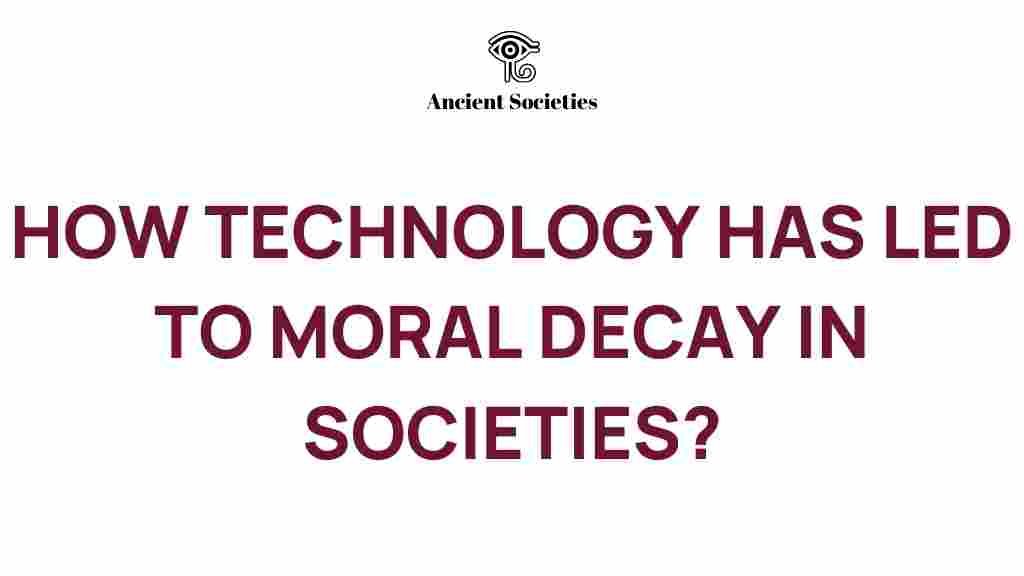The Dark Side of Progress: How Technology Fuels Moral Decay
In the digital age, the rapid advancement of technology has brought about significant changes to our daily lives, transforming the way we communicate, work, and interact with one another. However, as we embrace innovation, we must also confront the unsettling reality of how these advancements contribute to moral decay within society. The relationship between technology and societal change is complex, and while it offers numerous benefits, it often leads to ethical dilemmas and shifts in human behavior.
The Impact of Technology on Ethics
The digital age has ushered in unprecedented access to information and connectivity. However, this ease of access can lead to a decline in ethical standards. As we navigate through this landscape, we must consider the following:
- Information Overload: The sheer volume of information available can overwhelm individuals, leading to desensitization towards serious issues.
- Social Media Dynamics: Platforms that promote superficial engagement can erode genuine human connections and foster a culture of comparison and envy.
- Privacy Concerns: The constant surveillance enabled by technology raises questions about consent and the commodification of personal data.
These factors contribute to a gradual erosion of ethics within society, influencing how we perceive right and wrong in our interactions.
How Innovation Shapes Cultural Impact
Innovation is often hailed as the driving force behind progress. Yet, the cultural impact of these innovations can be profoundly negative. Consider the following:
- Normalization of Violence: The gaming industry, while providing entertainment, often glorifies violence, desensitizing players to real-life consequences.
- Cyberbullying: The anonymity provided by online platforms can lead to harmful behaviors that would be less likely in face-to-face interactions.
- Consumerism: The rise of e-commerce has fueled a culture of instant gratification, leading to a disregard for sustainability and ethical consumption.
As we embrace new technologies, we must be aware of their potential to distort our values and contribute to moral decay.
Understanding the Consequences of Technological Dependence
The consequences of our growing reliance on technology are far-reaching. From diminished social skills to altered perceptions of reality, the effects can be profound. To understand these consequences, we can break them down into several key areas:
Diminished Face-to-Face Interaction
As communication increasingly shifts to digital platforms, the ability to engage in meaningful face-to-face interactions declines. This shift can lead to:
- Increased Loneliness: Despite being more connected, individuals may feel isolated due to a lack of genuine relationships.
- Communication Barriers: The nuances of human emotion can be lost in text-based communication, leading to misunderstandings.
Altered Perceptions of Reality
With the prevalence of curated online content, individuals may struggle to distinguish between reality and the idealized versions presented online. This can result in:
- Unrealistic Expectations: Constant exposure to idealized lifestyles can lead to dissatisfaction with one’s own life.
- Identity Issues: People may struggle with their self-identity as they attempt to conform to online personas.
Ethical Dilemmas in the Digital Age
As we navigate this technological landscape, we face numerous ethical dilemmas, including:
- Data Privacy: Who owns the data generated by users, and how is it used?
- Artificial Intelligence: How do we ensure that AI systems are used ethically and do not perpetuate biases?
These dilemmas reflect a broader trend of moral decay emerging from the complexities of modern technological advancements.
Step-by-Step Process: Addressing Moral Decay in the Digital Age
To combat the moral decay fueled by technology, individuals and society as a whole must take proactive steps. Here’s a step-by-step process:
Step 1: Increase Awareness
Understanding the implications of technology on human behavior is crucial. This can be achieved through:
- Educational programs that focus on digital literacy.
- Community discussions about the ethical implications of technology.
Step 2: Promote Ethical Use of Technology
Encouraging responsible use of technology is essential. This includes:
- Setting guidelines for social media usage.
- Encouraging transparency in data collection and usage.
Step 3: Foster Genuine Connections
To counteract isolation, we must prioritize face-to-face interactions. This can be done by:
- Organizing community events that encourage personal connections.
- Creating spaces where technology-free interactions can occur.
Step 4: Advocate for Ethical Innovation
Supporting companies and initiatives that prioritize ethical considerations in their innovations can help mitigate the negative impacts of technology. This involves:
- Researching companies’ ethical practices before supporting them.
- Engaging in discussions about the implications of emerging technologies.
As we strive to address the challenges posed by technology, here are some troubleshooting tips for individuals:
- Set Boundaries: Establish specific times for technology use to foster a healthier relationship with digital devices.
- Stay Informed: Regularly engage with literature and discussions about ethics in the digital age.
- Be Mindful: Practice self-awareness about how technology affects your mood and interactions.
Conclusion: Embracing Responsibility in the Digital Age
As we continue to innovate and embrace technology, it is vital to acknowledge its potential to fuel moral decay and impact societal change. By fostering a culture of ethical awareness and promoting genuine human connections, we can mitigate the negative consequences of technological advancement. Each of us holds the responsibility to navigate this landscape thoughtfully, ensuring that our progress does not come at the cost of our moral and ethical values.
For more insights on the intersection of technology and ethics, check out this resource. To stay updated on the latest discussions surrounding societal change, visit this link.
This article is in the category Society and created by AncientSocieties Team

2 thoughts on “The Dark Side of Progress: How Technology Fuels Moral Decay”